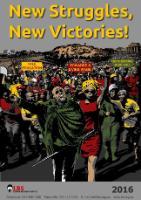
Eddie Cottle delivered a seminar entitled “Is South Africa at a turning point” as part of the Labour Studies Seminar Series. The series is jointly co-ordinated by the Neil Aggett Labour Studies Unit (NALSU) and the Departments of Sociology, History, and Economics and Economic History.
Eddie Cottle is a PhD candidate at the Institute of Social and Economic Research, Rhodes University. He is the former project leader of Collective Bargaining Support at Labour Research Service, Cape Town, South Africa. He was previously the Policy and Campaigns Coordinator of the Building and Wood Workers' International (BWI), Africa and Middle East Region. Eddie was also the coordinator of BWI's "Campaign for Decent Work Towards and Beyond 2010". He is editor of the book, South Africa's World Cup: A Legacy for Whom? (University of KwaZulu-Natal Press), published in 2011, which argued that mega-sporting events like South Africa's 2010 FIFA Soccer World Cup serve as fronts for massive accumulation and extraction of wealth, alongside increased sporting and socio-economic inequality.
Presentation Summary
Eddie Cottle indicates that, due to the crisis of representation and the attack on their living standards, workers have begun to bypass both the trade union movement and the industrial relations system in order to give effect to their demands for higher wages and changes in their conditions of work. He examines the strike dynamics of the post office strike, the Marikana strike, the farmworkers' strike, the "Outsourcing Must Fall" movement as well as the NUMSA strike. Cottle argues that a new historical moment has arrived with a new trend of unprotected strikes, the increasing tendency for strikes to be of a long duration, self-representation of workers through workers' committees, the phenomena of worker-community alliances, including the student worker-academic alliance. These are all indicators that a new level of consciousness has developed against the effects of neo-liberal capitalism. He further demonstrates that the strikes gave rise to structural effects which indicates that South Africa has indeed reached a turning point.
